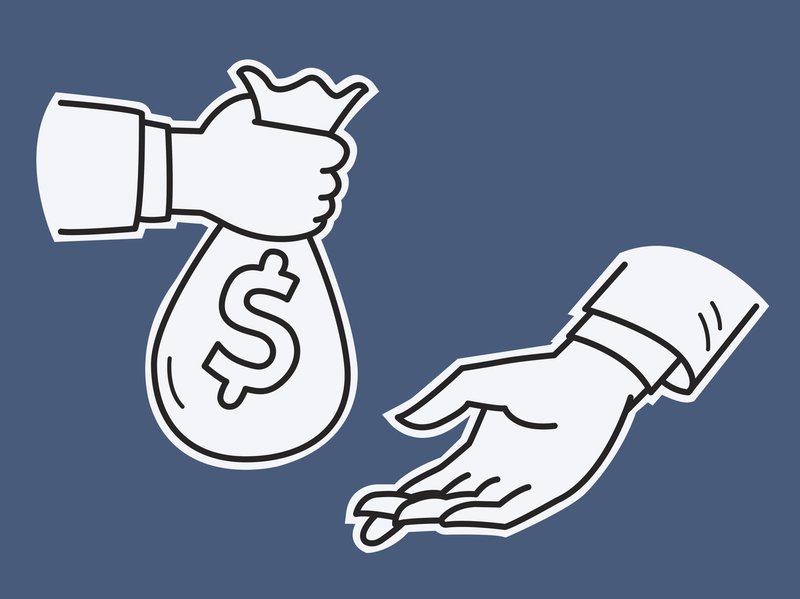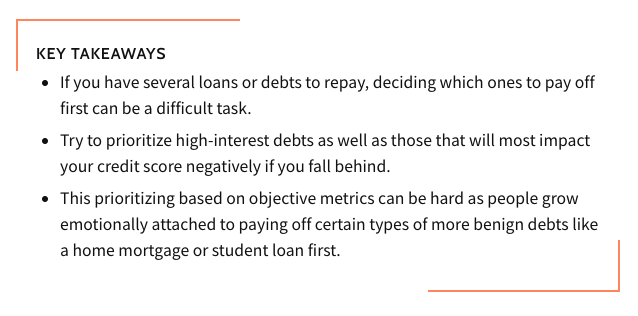
By DANIEL KURT
May 6, 2020
There are few things as disheartening as finding yourself under a massive amount of debt. Unfortunately, that’s an experience many consumers have, whether it’s maxing out credit cards or financing a new home. So, if you have a few extra dollars in your bank account, you should use them to pay down your loans ahead of schedule, right?

In reality, choosing to eliminate your debt is not so clear-cut. Though some loans are inherently toxic to one’s financial picture, other forms of credit are relatively benign. When you consider the alternate ways in which you can spend your excess cash, it might do more harm than good to use it to pay more than your monthly minimum.

Debts to Eliminate Now
Which loans to pay off first? Well, some kinds of debt should be eliminated as quickly as possible, like credit card debt. Why? Because the math is radically different when you look at credit card debt, which for many consumers comes with a double-digit interest rate. The best strategy for credit card balances is to get rid of them as quickly as you can.
In addition to ridding yourself of a big interest charge, ditching credit card debt will likely also improve your credit score. About a third of your all-important FICO score is tied to how much you owe creditors—and revolving credit card balances are weighted against you even more than other types of debt. 1
By lowering your “credit utilization ratio”—how much you owe in relation to your available credit—you can boost your score and improve your chances of getting the loans you truly need. A good rule of thumb is to borrow no more than 30% of your total credit line.2
Another form of credit that can hurt your finances is an auto loan. While the interest rate on these is fairly low these days, it’s the length of these loans that can be a concern. According to Experian Automotive, the average car loan lasts nearly six years. That’s well beyond the basic warranty period for most manufacturers, so you could be on thin ice if something happens to your vehicle and you still have a loan balance.3

Debts to Pay Down Later
Should I pay off my mortgage? Which types of debt are better to pay down later? These are questions that can be answered—most financial experts agree that student loans and mortgages belong in the above category. That's in part because some mortgages carry a prepayment penalty if you retire the loan early. But perhaps an even bigger consideration is how inexpensive these loans are compared to other forms of debt. That’s especially true in a low-interest-rate environment.
Many homeowners today are paying between 4% to 5% on their mortgage. Many federal student loans for undergraduates currently charge a similar rate, at 4.53% on the loan.4
Those rates are even cheaper when you consider that interest on both of these loans is generally tax-deductible. Let’s assume that you have a 30-year mortgage with a fixed interest rate of 4% on the loan. Even if you don’t have any other loans with a higher interest rate, you might not want to pay more than the minimum amount due each month.
Why? Because your extra dollars could be put to better use. Economists refer to this as an "opportunity cost." Even if you’re on the extremely conservative side, investing that money into a diversified portfolio gives you a very good chance of returning more than 4% on it. The average annual return on U.S. stocks over time has roughly been around 10% return for investments.5
Tax-Advantaged Accounts
Here’s where we should remember the old adage: past performance does not guarantee future results. And certainly, stocks can experience volatility in the short-term. But the point is that over time the market has shown a tendency to return well over 4% during the long haul.
If you’re putting your spare money into tax-advantaged retirement accounts such as a 401(k) or a traditional IRA, the benefit of investing your spare money is even stronger. That’s because you can deduct your contributions to these accounts from your taxable income.6
When you accelerate student loan and mortgage payments, you’re doing the opposite; you’re using post-tax dollars to reduce tax-deductible interest. So while there may be an emotional benefit to getting rid of these loans, it very often doesn’t make sense from a purely mathematical standpoint.
Consider Creating an Emergency Fund
While paying down high-interest-rate loans is an important goal, it shouldn’t necessarily be your first priority. Many financial planners suggest your first goal should be creating an emergency fund that can cover between three to six months’ worth of expenses.
It’s also wise to avoid pre-paying your loans at the expense of a retirement account. Except for specific circumstances, taking funds from your 401(k) early will trigger a costly 10% penalty on the entire withdrawal.
Forgoing contributions to your employer’s retirement plan can be just as perilous, especially if it offers a matching contribution. Let’s say your company offers a match of 50 cents on every dollar you put into the account, up to 3% of your salary.
Until you hit the match, for each dollar you pay to a lender instead of your 401(k), you’re essentially throwing away a third of your possible investment (50 cents of the total $1.50 contribution). Only after you’ve contributed enough to tap all the matching funds available should you pay more than the monthly minimum payment, even on credit card debt.
The Bottom Line
There are certain types of debt that you should eradicate as soon as you can (except at the expense of employer matches to tax-advantaged retirement accounts). But with low-interest rate loans, including student loans and mortgages, you’re normally better off diverting extra cash into a tax-advantaged investment account.
If you have enough left over to max out your allowable annual contributions for an IRA and 401(k), any extra cash beyond that amount should go into a regular investment account rather than toward paying off low-interest loans. You'll net more money in the end.
- FICO. "What Is Amounts Owed?" Accessed May 4, 2020.
- Experian. "What Is A Good Credit Utilization Rate?" Accessed May 4, 2020.
- Experian. "Auto Loan Debt Sets Record Highs." Accessed May 4, 2020.
- Federal Student Aid. "Federal Interest Rates and Fees." Accessed May 4, 2020.
- Moneychimp. "Compound Annual Growth Rate (Annualized Return)." Accessed May 4, 2020.
- Internal Revenue Service. "Topic No. 424 401(k) Plans." Accessed May 4, 2020.



